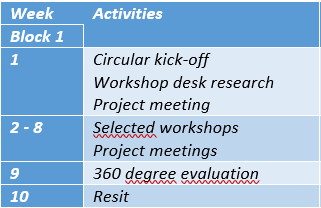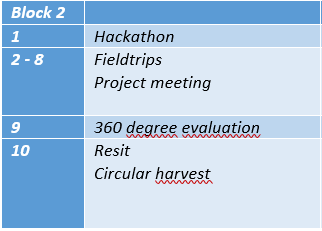Facts and figures
The programme at a glancePart of School
Programme information
What to expectAbout the programme
No time to waste
Not a day goes by without news on climate change, the impacts it has on our global society, and the need for organisations to adapt and improve their goals and business processes. We have another 12 years to make the necessary changes, and your contribution truly counts. A recent study called Project Draw Dawn (2018) shows 80% of the technological innovations are already invented.
What is needed is action! And you could be part of it. The economy of take-make-waste is no longer a viable, sustainable business model, and this message is understood by a growing number of companies among which DSM, IKEA, Arend, Dell, Timberland, Nike, Philips and Auping. Businesses are looking to adapt circular economy principles, and a growing number of professionals are needed to make these transitions.
Method
This programme involves a mixture of work forms and tools:
- Project: the fieldwork activities concern all activities associated with the assignment for the client organisation. You work in a group of 4 – 6 students on this project for the duration of the minor.
- Workshops (theoretical part) on the themes business research, circular in action, tools for the circular economy, finance
- Digital learning platform: this is used to stimulate discussions, find up to date material on the circular economy, case studies, and of course all the materials that support the Fieldlab activities.
Type of Assessment
You have to submit (workshop) assignments, multiple choiche exam, a research report with your project group, presentation and you will be evaluated on your collaboration with the coach, company and your team members.
Learning outcomes
If you have successfully completed this exchange programme then you are able to:
- Explain how the circular economy differs from the linear economy in terms of drivers, frameworks, structures, processes, financing, legislation and obstacles.
- Collect and analyse data and report usable findings in a transparent and systematic fashion (Business research).
- Create a feasible solution for a Circular Economy (CE) project that incorporates a new perspective, product/service and manages obstacles in order to contribute to a CE transition.
- Evaluate the implications of a CE business model from a financial, environmental and social perspective in general and in particular for the CE project.
- Demonstrate a professional attitude in managing the project deliverables within the project team, the client organisation, the project coach and the other coaches of the Fieldlab team.
Calendar
Block 1

Block 2

Blocks
Every school year is divided into two semesters. A fall semester (September – December/January) and a spring semester (February – June/July). Both semesters are divided into two blocks. Block 1 and 2 for the fall semester and block 3 and 4 for the spring semester.
Awarding
After completing your exchange programme at Rotterdam University of Applied Sciences, you will receive a:
- Transcript of records
Course related questions?
For course related questions, please contact Mr. Egbert Langras (content representative/programme coordinator) and Ms. Tineke van der Gaast (International Academic Coordinator, Rotterdam Business School).
Subjects
You have to complete all subjects successfully to gain the 30 ECTSBlock 1
-
Project Circular Economy & B. Innovation (7 ECTS)
Project Circular Economy & B. Innovation (7 ECTS)
Topics
- Students work on a fieldcase in groups of 4-6 students maximum.
- The case involves a challenge on the way of transiting to a circular economy. Every year, a number of field projects are selected.
In 2020-2021 the projects relate to the circularity in the textile industry, developing geographic ecosystems. It is also possible for students to develop their own circular venture.
Learning materials
Ditigal learning platform
Learning outcomes
- Collect and analyse data and report usable findings in a transparent and systematic fashion (Business research);
- Create a feasible solution for a Circular Ecomy (CE) project that incorporates a new perspective, product/service and manages obstacles in order to contribute to a CE transition;
- Evaluate the implications of the CE solution from a financial, environmental and social perspective in general and in particular for the CE project.
-
Theory Circular Economy & B. Innovation (5 ECTS)
Theory Circular Economy & B. Innovation (5 ECTS)
Topics
- Students select 10 workshops. The workshops will be delivered digitally. At minimum one from each domain. Domains are:
- Research skills
desk research, qualitative research, quantitative research. - Circular in action
sustainable business models, circular construction, biobased applications, circular product design, circular supply chain. - Impact
assessing environmental impacts foundation, assessing environmental impacts advanced, assessing social impacts, assessing financial impacts. - Tools for Circular Economy
consulting skills, block chain, platform models, financial basics, funding sustainable businesses, calculating the business case.
- Research skills
Learning materials
All workshop material is offered via a digital platform called Moodle. Students receive latest one week before the kick-off, the details to prepare an account.
Learning outcomes
-
Explain how the circular economy differs from the linear economy in terms of drivers, frameworks, structures, processes, financing, legislation and obstacles.
Students demonstrate having knowledge to complete the field project successfully.
- Students select 10 workshops. The workshops will be delivered digitally. At minimum one from each domain. Domains are:
-
Process Circular Economy & B. Innovation (3 ECTS)
Process Circular Economy & B. Innovation (3 ECTS)
Topics
- Develop as professionals and convince your coaches that they have done so.
- Achieve a personal growth.
- Work on your competencies of collaboration, professional communication and curiousity
Learning materials
Digital learning platform.
Learning outcomes
- Demonstrate a professional attitude in managing the project deliverables within the project team, the client organisation, the project coach and the other coaches of the Fieldlab team
- Grow personally as a professional
- Collaborate with all relevant stakeholders
- Eagerness to explore and find people and information that are necessary for a successful outcome.
For this minor we consider of th e utmost importance for a successful outcome.
Block 2
-
Project Circular Economy & B. Innovation (7 ECTS)
Project Circular Economy & B. Innovation (7 ECTS)
This subject is similar to the Project Circular Economy & B. Innovation that started in block 1. However, also in block 2 you have to gain 7 ECTS to successfully complete the course.
-
Theory Circular Economy & B. Innovation (5 ECTS)
Theory Circular Economy & B. Innovation (5 ECTS)
Topics
- Hackathon
- Fieldtrips
- Guest lectures
Learning materials
Digital learning platform.
Learning outcomes
- Student shows expertise in an Circular Economy area and is able to disseminate this knowledge to the general audience.
-
Process Circular Economy & B. Innovation (3 ECTS)
Process Circular Economy & B. Innovation (3 ECTS)
This subject continues in block 2. Also in block 2 you have to gain 3 ECTS to successfully complete the course.
Practical matters
What you need to knowLocation Kralingse Zoom
Where you can find us

